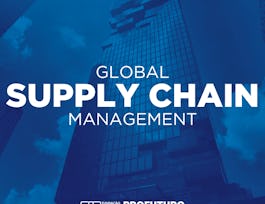In this course, we’ll learn about more advanced machine learning methods that are used to tackle problems in the supply chain. We’ll start with an overview of the different ML paradigms (regression/classification) and where the latest models fit into these breakdowns. Then, we’ll dive deeper into some of the specific techniques and use cases such as using neural networks to predict product demand and random forests to classify products. An important part to using these models is understanding their assumptions and required preprocessing steps. We’ll end with a project incorporating advanced techniques with an image classification problem to find faulty products coming out of a machine.



Advanced AI Techniques for the Supply Chain
Ce cours fait partie de Spécialisation Machine Learning for Supply Chains


Instructeurs : Rajvir Dua
1 838 déjà inscrits
Inclus avec 
(12 avis)
Expérience recommandée
Compétences que vous acquerrez
- Catégorie : Bias–Variance Tradeoff
- Catégorie : Machine Learning
- Catégorie : Supply Chain
- Catégorie : Natural Language Processing
- Catégorie : Image Analysis
Détails à connaître

Ajouter à votre profil LinkedIn
4 devoirs
Découvrez comment les employés des entreprises prestigieuses maîtrisent des compétences recherchées

Élaborez votre expertise du sujet
- Apprenez de nouveaux concepts auprès d'experts du secteur
- Acquérez une compréhension de base d'un sujet ou d'un outil
- Développez des compétences professionnelles avec des projets pratiques
- Obtenez un certificat professionnel partageable


Obtenez un certificat professionnel
Ajoutez cette qualification à votre profil LinkedIn ou à votre CV
Partagez-le sur les réseaux sociaux et dans votre évaluation de performance

Il y a 4 modules dans ce cours
In this module, we'll learn about the use cases of machine learning in the supply chain. We'll start with the big picture applications before diving deeper into specific algorithms, including neural networks. Throughout the module, we'll explain not only the general artificial intelligence concepts and mathematics, but also how these algorithms can specifically be used for the supply chain.
Inclus
4 vidéos4 lectures2 devoirs1 sujet de discussion1 laboratoire non noté
In this module, we'll cover the concepts relating to the ML paradigm. We'll start by learning how to pick a model, relying on considerations such as managing the bias-variance tradeoff. Next, we'll explore how machine learning models converge, including the use of stochastic gradient descent to minimize loss functions. Finally, we'll end with some practical considerations on coding advanced AI models with libraries for hyperparamter tuning.
Inclus
3 vidéos4 lectures1 devoir1 devoir de programmation3 laboratoires non notés
In this module, we'll expand beyond numbers and learn how to use machine learning on images and text. We'll start by talking about how to analyze text data and cover the primary methods behind natural language processing. Then, we'll learn how to analyze images by constructing convolutional neural networks complete with convolutions and pooling layers.
Inclus
5 vidéos5 lectures1 devoir1 sujet de discussion2 laboratoires non notés
In this final project, we’ll apply what we learned in the last module to classify images of products based on whether there is a defect or not.
Inclus
1 devoir de programmation1 laboratoire non noté
Offert par
Recommandé si vous êtes intéressé(e) par Machine Learning

University of Virginia

Fundação Instituto de Administração

Macquarie University

Amazon Web Services
Pour quelles raisons les étudiants sur Coursera nous choisissent-ils pour leur carrière ?





Ouvrez de nouvelles portes avec Coursera Plus
Accès illimité à 10,000+ cours de niveau international, projets pratiques et programmes de certification prêts à l'emploi - tous inclus dans votre abonnement.
Faites progresser votre carrière avec un diplôme en ligne
Obtenez un diplôme auprès d’universités de renommée mondiale - 100 % en ligne
Rejoignez plus de 3 400 entreprises mondiales qui ont choisi Coursera pour les affaires
Améliorez les compétences de vos employés pour exceller dans l’économie numérique
Foire Aux Questions
Access to lectures and assignments depends on your type of enrollment. If you take a course in audit mode, you will be able to see most course materials for free. To access graded assignments and to earn a Certificate, you will need to purchase the Certificate experience, during or after your audit. If you don't see the audit option:
The course may not offer an audit option. You can try a Free Trial instead, or apply for Financial Aid.
The course may offer 'Full Course, No Certificate' instead. This option lets you see all course materials, submit required assessments, and get a final grade. This also means that you will not be able to purchase a Certificate experience.
When you enroll in the course, you get access to all of the courses in the Specialization, and you earn a certificate when you complete the work. Your electronic Certificate will be added to your Accomplishments page - from there, you can print your Certificate or add it to your LinkedIn profile. If you only want to read and view the course content, you can audit the course for free.
If you subscribed, you get a 7-day free trial during which you can cancel at no penalty. After that, we don’t give refunds, but you can cancel your subscription at any time. See our full refund policy.

